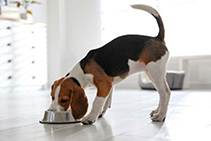
As a veterinarian, I frequently receive inquiries from pet owners about the best food for their dogs. It can be difficult to choose the right brand of dog food given the numerous options available in the market. After years of experience and research, I will tell you what I have learned.
Like humans, every dog is unique and may require a specific type of diet to meet their individual nutritional needs. Overall, a good dog food is one that:
A dog eats well and consistently (they need to like the food)
There are no signs of discomfort or gastrointestinal upset after eating (no drooling, no excessive licking/smacking lips, no excessive flatulence/gas, no chronic or intermittent vomiting or diarrhea)
The dog's stool is normal in consistency, amount, and frequency and stool is not overly malodorous/stinky
The dog has good skin and hair coat
The dog has good energy levels
The food is appropriate for the stage of life of the dog (ex. puppy/growth, adult, senior, reproduction, or *all stages)
In addition to the above general principles, there are several other criteria that a dog food must fulfill for me to recommend it to my patients. When choosing a food, I follow the WSAVA Global Nutrition guidelines and look to see if a dog food brand:
Employs a nutritionist (either a PhD, ACVN, or ECVCN)
If that employed nutritionist is the one formulating the diets
The food meets or exceeds the AAFCO minimum nutritional standards and is backed by feed trials
The diets are quality controlled, have random toxicity screening, and have guaranteed nutritional analysis (meaning what is on the label is actually what is in the bag of food)
I also recommend reading the label on the bag and opting for a dog food that is NOT grain free, with a label that reads “complete and balanced”.
Recent data has shown a correlation between feeding grain-free diets and the development of dilated cardiomyopathy (DCM) and heart failure in dogs. In my experience, if a dog truly does have an allergy/reaction to a diet, it is most likely the protein source in the diet. Beef and chicken are the most common culprits of food allergies in dogs. Therefore, grain-free diets do not solve the problem and may actually be detrimental to your dog.
Currently, the only brands of dog food that meet these standards are Purina (Pro Plan), Royal Canin, Hill’s Science Diet, Eukanuba, and IAMS. These brands of dog food are what I recommend as a veterinarian and what I feed my own pets.
Dr. Lindsay Nicholson, DVM
Director of Medicine
True Animal Vet
Please see below for additional information:










